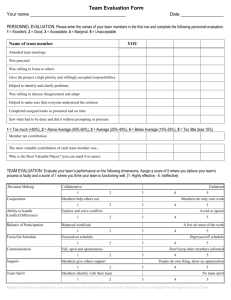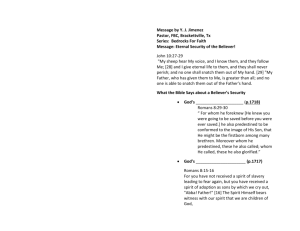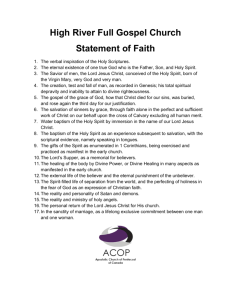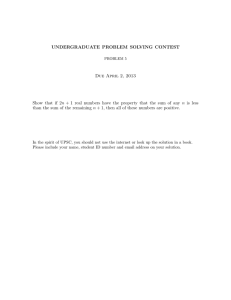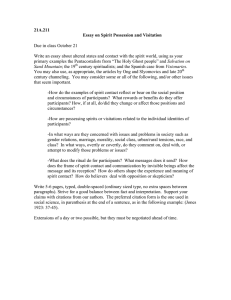Life in the Spirit Purpose
advertisement
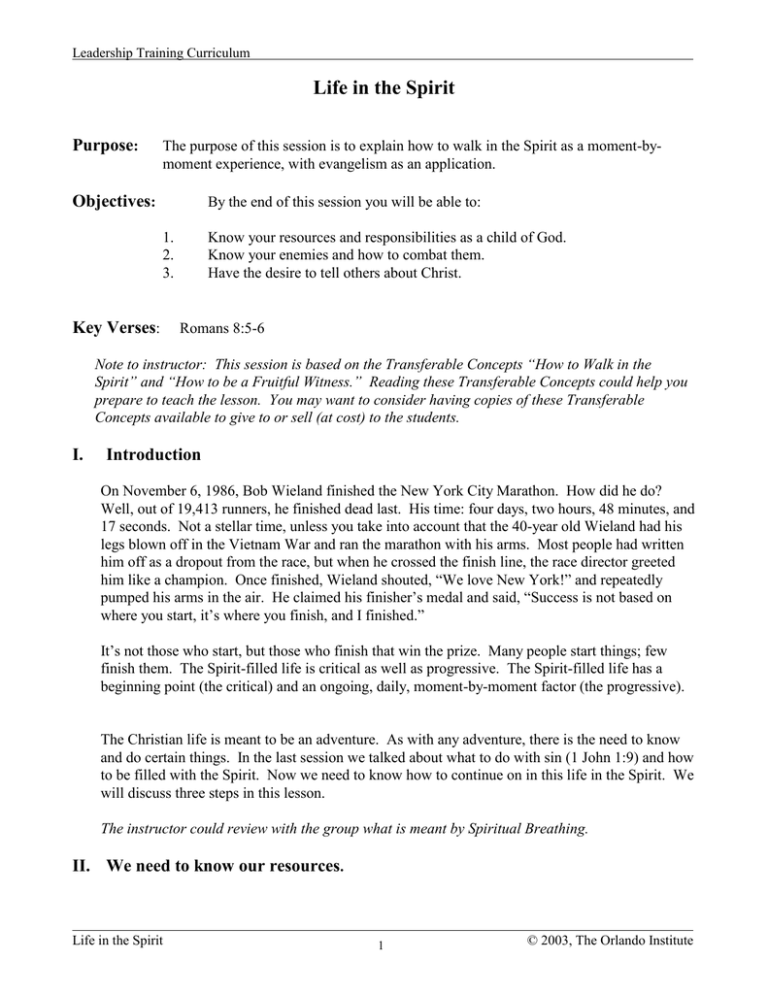
Leadership Training Curriculum Life in the Spirit Purpose: The purpose of this session is to explain how to walk in the Spirit as a moment-bymoment experience, with evangelism as an application. Objectives: By the end of this session you will be able to: 1. 2. 3. Key Verses: Know your resources and responsibilities as a child of God. Know your enemies and how to combat them. Have the desire to tell others about Christ. Romans 8:5-6 Note to instructor: This session is based on the Transferable Concepts “How to Walk in the Spirit” and “How to be a Fruitful Witness.” Reading these Transferable Concepts could help you prepare to teach the lesson. You may want to consider having copies of these Transferable Concepts available to give to or sell (at cost) to the students. I. Introduction On November 6, 1986, Bob Wieland finished the New York City Marathon. How did he do? Well, out of 19,413 runners, he finished dead last. His time: four days, two hours, 48 minutes, and 17 seconds. Not a stellar time, unless you take into account that the 40-year old Wieland had his legs blown off in the Vietnam War and ran the marathon with his arms. Most people had written him off as a dropout from the race, but when he crossed the finish line, the race director greeted him like a champion. Once finished, Wieland shouted, “We love New York!” and repeatedly pumped his arms in the air. He claimed his finisher’s medal and said, “Success is not based on where you start, it’s where you finish, and I finished.” It’s not those who start, but those who finish that win the prize. Many people start things; few finish them. The Spirit-filled life is critical as well as progressive. The Spirit-filled life has a beginning point (the critical) and an ongoing, daily, moment-by-moment factor (the progressive). The Christian life is meant to be an adventure. As with any adventure, there is the need to know and do certain things. In the last session we talked about what to do with sin (1 John 1:9) and how to be filled with the Spirit. Now we need to know how to continue on in this life in the Spirit. We will discuss three steps in this lesson. The instructor could review with the group what is meant by Spiritual Breathing. II. We need to know our resources. Life in the Spirit 1 © 2003, The Orlando Institute Leadership Training Curriculum The instructor could break the class up into 3 groups to look up verses and discover what we need to live in the Spirit. Have them read the verses in their section and discuss their answers to the question in their section. Give them 15 minutes. Then have them share with the class what they discovered. #1: What do the following verses say about our resources in terms of Position, Provision and Purpose? 2 Peter 1:3-5; 2 Corinthians 5:20; Ephesians 1:3-23 #2: What do the following verses say about our responsibilities as a Christian? 1 Peter 1:14-16; 1 Peter 4:10-11; 2 Timothy 4:5; John 13:34-35; Matthew 28:18-20 #3: What do the following verses teach us about our enemies? 1 John 2:15-17; Galatians 5:17; Ephesians 6:10-13 A. Our resources: (2 Peter 1:3-5; 2 Corinthians 5:20; Ephesians 1:3-23). What form do resources come in? The answer: Position; Provision; Purpose. Position Provision Purpose (Who I am) Child of God (Adoption) Forgiven Ambassador Seated in the Heavenlies The victor (What will enable me?) Bible Prayer Gifts/Abilities Faith Holy Spirit Promises of God Family of God (Mission: Where am I going?) Calling Love Eternity How do we discover these resources and become comfortable with them? 1. The Word 2. Prayer 3. Obedience (experience) 4. Other Christians It is one thing to know something, but it is another to do something with it. How do we activate our resources? Life in the Spirit 2 © 2003, The Orlando Institute Leadership Training Curriculum We must live by faith. Faith says, “God said it; it is so,” and acts accordingly (Hebrews 11:1). Faith pleases God and releases His provision for us (Hebrews 11:6). Jesus couldn’t do miracles in His hometown because of lack of faith. The centurion received his request, as well as the Syro-Phoenecian woman, because of faith. The object of our faith is God and His Word. Faith is demonstrated in obedience and a thankful spirit (1 Thessalonians 5:18). How do we short-circuit the resources God has provided for us? Disobedience or lack of faith (Hebrews 4:1-2) B. Our responsibilities 1. 2. 3. 4. Holiness (1 Thessalonians 4:3; 1 Peter 1:14-16) Fulfill our calling (1 Peter 4:10-11; Romans 12:6ff; 2 Timothy 4:5) Love one another (John 13:34-35) Tell others about Jesus (Matthew 28:18-20) We will use #4 as an example. There are two essential steps to effective witnessing. a. The first is to be prepared. There are two aspects to preparation. They are . . . 1) Heart preparation: The first thing we need to do to prepare ourselves according to Peter is to “sanctify Christ as Lord in our hearts”. How do we do that? Sanctify means to set apart. Thus, to “sanctify Christ as Lord” means to set Him apart from all others as Lord in our lives, or, to be under His control - to be filled with the Holy Spirit. 2) Mind preparation: After our hearts have been rightly prepared, then our minds must be properly prepared. We need to know the right things to say. The instructor could mention, “John 17:17 says, ‘Sanctify them in the truth. Thy Word is truth.’ God’s Word sets us apart and prepares us to share Christ. Participating in a training like this also helps Christians be prepared.” b. The second step is to take the initiative to tell others about Christ. Why are the following four points important? Write reasons for each and be prepared to discuss in class. 1) Pray for the lost and for God to lead us to those whom He has set apart for salvation. Think of this in terms of spheres of influence (Relatives, Friends, Associates and Neighbors). Instructor could ask, “Why is this important?” (Allow the class some time to share answers. After a few minutes, and if this has not been mentioned, you could say, “Prayer expresses our dependence on God. We need God to do what only God can do - John 15:5.”) Life in the Spirit 3 © 2003, The Orlando Institute Leadership Training Curriculum 2) Go and tell others of God’s love for mankind. Instructor could ask, “Why is this important?” (Allow the class some time to share answers. After a few minutes, and if this has not been mentioned, you could say, “This is important because rarely will people come to you asking about how Jesus can save them. In Matthew 28:19, Jesus said to ‘Go.’”) 3) Talk about Jesus. Instructor could ask, “Why is this important?” (Allow the class some time to share answers. After a couple minutes, and if this has not been mentioned, you could say, “This helps us to avoid side issues like past bad experiences with churches or other Christians.” See Colossians 1:28) 4) Expect God to use you. Instructor could ask, “Why is this important?” (Allow the class some time to share answers. After a couple minutes, and if this has not been mentioned, you could say, “This demonstrates our faith that we believe John 4:35 that says the fields are white unto harvest. It also demonstrates that we believe we have the answer to the world’s problems which is Jesus changing people’s hearts (2 Corinthians 5:17).”) Our job in witnessing is to proclaim the good news of Christ’s payment for our sin. It is the Holy Spirit’s job to do the convicting and converting (John 16:811). For this reason we believe that, “Success in witnessing is simply taking the initiative to share Christ in the power of the Holy Spirit and leaving the results to God.” If you want to be a faithful witness for our Savior, simply be Prepared, Pray, Go, and talk about Jesus! C. Our Enemies 1. The World. I John 2:15-17 commands us not to love the world. In this context, "world" refers to everything man has set up to find significance and security apart from God. It is comprised of all external forces that work to draw us away from God and find our meaning and fulfillment in temporal things. Pride in one's own self-sufficiency and the desire to please the senses are the hallmarks of the "world." How do we overcome the world? John tells us that our faith is what overcomes the world (1 John 5:4). In this context faith specifically refers to believing what God says is true about reality, over what the Life in the Spirit 4 © 2003, The Orlando Institute Leadership Training Curriculum world says is true. Because Jesus has overcome the world, we, too, can overcome the world through Him (John 16:33). 2. The "flesh" (Galatians 5:17). Whereas the "world" is everything external, the flesh--our old sin nature--wars within us. When a person becomes a Christian, the "old man" is dethroned. But he continually tempts us to put him back on the throne. He strives against God and righteousness, deceiving us into believing lies about God, about ourselves, and about the world around us, and trying to cause us to turn away from God. The Spirit wages war against the flesh. This conflict will rage as long as we live. To win this battle, we must do four things. First, we must walk in the Spirit as was described in the previous lesson (Galatians 5:16). Next, through the Spirit's enabling we must deny the desires of the flesh (Galatians. 5:19-21; Romans 8:12-13; Colossians 3:5). Third, we need to be alert in prayer (Matthew 26:41). Finally, there are certain things we are commanded to flee from. We are to flee youthful lusts (2 Timothy 2:22), immorality (1 Corinthians 6:18), idolatry (1 Corinthians 10:14) and the quest for wealth (1 Timothy 6:10-11). 3. The final battlefield is with the devil (1 Peter 5:8). He is a real foe and ruler of this world (Ephesians 2:1-3). Jesus said that from the beginning he was a murderer and a liar (John 8:44). Satan's strength lies in his ability to deceive us, to lie. What does he lie about? (Hebrews 2:14-16; Genesis 3:4-5; 2 Corinthians 11:14). We have nothing to fear, however, from Satan if we depend upon Christ and not on our own strength. Satan was defeated, disarmed and made a public display of 2,000 years ago at the cross. We have the assurance that "greater is He who is in us than he who is in the world" (1 John 4:4b). We are to resist the devil (1 Peter 5:8,9), put on our spiritual armor and stand firm in our faith (Ephesians 6:10-20). Though we must be prepared for spiritual conflict, we must also remember that the battle is not ours, but the Lord's (2 Chronicles 20:15). In summary, how do we obtain victory over our three foes? In which of these areas do you need to trust God to develop in your life? Note to instructor: Allow some students to share answers. They should mention that in summary of Section II.C. (the world, the flesh, and the devil) it appears that for us to be victorious against these foes, we need to walk in the Spirit, use God’s Word, be sober in prayer, and firm in our faith. Allow them to share in which areas they need to trust God to develop in their life. Perhaps the instructor could also share in which areas you need to trust God to develop in your life. Life in the Spirit 5 © 2003, The Orlando Institute Leadership Training Curriculum III. Lesson Summary A. B. C. D. Be filled with the Spirit and practice spiritual breathing. Learn about and utilize your God-given resources by faith. Fulfill your responsibilities as a Christian through the Spirit’s enabling. Know your enemies and how to combat them. IV. Application A. B. C. Memorize verses that deal with resources that you regularly need, but fail to use. Discuss with your mentor an area where you have not done well in fulfilling your responsibilities as a Christian and come up with a plan to begin to do so. Which enemy do you most often have the biggest problems with? What steps do you need to take to fight against this foe? Discussion questions: 1. What are some of your resources and responsibilities as a child of God? 2. Who are your enemies and how do you combat them? 3. How has this lesson helped you develop the desire to tell others about Christ? Life in the Spirit 6 © 2003, The Orlando Institute


